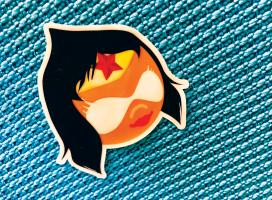The Women of the Drupal Community: MarieKirya

Collection :
Name: Marie Kiryanova
Drupal.org ID: MarieKirya
Location: Boston MA
Job Title: Associate Architect
The Drupal community is built on a core set of Values and Principles that encourage users to make better decisions faster and inspire members to be their best selves and move forward as a unified community. These values encourage inclusion; yet, Drupal still suffers from a lack of diversity and unequal gender representation. Tech and open source projects can only succeed by embracing a wide range of diverse ideas and perspectives. While, organizations such as the Drupal Diversity and Inclusion Workgroup advocate for greater diversity in the community and more inclusive events to help create safe spaces, there’s still more work to be done. To keep making progress, we all need to give a platform to different voices in the Drupal space.
Acquia’s Women of the Drupal Community series aims to provide unique viewpoints into how different women have made careers in the Drupal space and share their tips for navigating and thriving in the tech landscape. Previously, we featured Lynette Miles, technical support leader on the pride in crafting top-notch documentation and the key to balancing work and family life.
This month, I spoke with Marie Kiryanova, a software engineer at award-winning digital design agency and Acquia partner -- Third and Grove. As someone who is still just a few years into her developer career, Marie believes in helping younger tech workers gain confidence and advocates for more support for people interested in tech careers beyond the typical higher education route. Keep reading to learn how Marie carved her own path in the tech world and how she hopes to see Drupal evolve in the future.
Paige: How did you get your start in tech?
Marie: I first started out because it was a way to get comfortable with the English language after my family moved to the United States. Playing games and talking to people was far easier for me when I had the ability to read over what I was about to say. What started as a way to get comfortable with a language became a real interest. I developed a really good student-teacher relationship with my computer teacher in middle school. I had no problem learning the basics at a young age and it became my focus as I entered into adult life.
Paige: How did you first discover Drupal?
Marie: I was setting up a website for a small gaming community in early high school. I needed to put together content sites in a way that wasn't just putting together HTML files over FTP. After exploring my options I tried installing Drupal 5. It wasn't anything super fancy, but I liked being able to host my own site and being able to log in and create pages without copying and pasting headers and footers.
Paige: What Drupal function, project or contribution are you working on and/or most proud of?
Marie: The one Drupal project I always feel most proud of is working on the Solidworks team. There I had the ability to teach people best practices and other skills. I think that mentorship is one of the strongest things in tight-knit communities like the Drupal one. I was teaching a team of people unfamiliar with the entire ecosystem skills like git version control, composer package management, module structures and page building techniques. It felt like I was contributing more than just code and making a positive impact. I do wish I could contribute more than the off patch to Drupal.org, but it's still nice to see people commenting on old patches I've written saying that it helped them.
Paige: What are some challenges you've faced, technically or career-wise?
Marie: Definitely my work-life balance has been the hardest thing I've faced in my career. While burnout isn't unique to development or Drupal, it's so easy to get wrapped up in trying to perfect a feature, or pleasing a client or trying to get recognized. Feeling like you're actually doing something useful is really important to stay motivated. This feels like a pretty common issue with those I've talked to both in and out of my employer, especially for remote workers. No one can tap them on the shoulder and say "It's okay, just go home."
The other issue was feeling too young (both age and experience) to feel like an authority on a project. It's very important to me for even junior developers to be able to be hands-on with important projects under guidance. That's the way a lot of people learn. It's hard for juniors to grow when they're just tasked with updating modules and basic support tasks. I had to learn a lot about the position I was hoping to be in by being tossed into issues and learning on the spot. And having someone there to tell you when you’re going to make a mistake is crucial.
Paige: What inspires you? What keeps you passionate about your work?
Marie: Being able to learn and teach people keeps me motivated at work. Web technologies move so fast that you're always needing to learn new approaches for both back-end and front-end tasks. And being able to teach, explain, and educate a wide variety of people with different skills and jobs is a fantastic part of my job when I get to do so. Being a teacher has always been a tempting option for me, but managing a classroom of students isn't for me. Getting to work with a lot of skilled and motivated individuals either one-on-one or in small groups to learn and teach just scratches that itch for me.
Paige: What are some other aspects of the Drupal community that you're involved in?
Marie: I went to my first DrupalCon this year. I did enjoy talking with community members and watching panels. It made me get off my butt and finally make my own site to experiment with everything I learned there.
Paige: How do you think we can help empower women in tech and work toward better gender inclusion?
Marie: For the current generation, I think it's important to provide entry roles to those without formal education in the technology field. There are so many people who have the skills and critical thinking but are stuck in other fields where they can't afford the time or money to go back to re-educate themselves. Technology is something that is more and more about being able to express yourself in ways that we couldn't have thought of before. Not everyone is using technology to save lives, we're building websites!
You don't need to know all the fancy algorithms and their efficiency to build something interesting. So making that infrastructure to have women who see a new opportunity in the tech industry to take it is one of the ways I can see helping with gender inclusion in tech.
For the future generation, it's important for children to have access to classes that teach them programming and encourage everyone to try even the most basic of tasks. Children don't have the same biases that we do. If we can break those biases before they happen, I can see a much more diverse future in the tech industry. A benefit of that is we introduce technology as a career choice much earlier on rather than waiting until deciding a college major. By that point, a lot of young women are worried about going into STEM and not ready to risk paying a bunch of college loans for the wrong degree.
Paige: What does the future of Drupal look like in your opinion? More adoption, new features, any major changes?
Marie: If I had a wishlist, the first bullet point would be improving the backend UX. With all the talk of Drupal trying to make it as a decoupled CMS, it's really important to entice not only the engineering staff but all the content writers and staff to have an intuitive experience. Drupal is good at providing the tools for a site builder, but then it’s up to the site builders to make a pleasant editing experience for the editors. It makes Drupal definitely feels a little dated in that aspect.
On the engineering side, I think it will continue on its steady adoption as developers spread the word and show all the powerful underlying technology to others. Drupal is hard for beginners, but once you get deep into it, it provides a lot of backbone to getting tasks done very fast.
Paige: What advice would you give your younger self or someone who is just starting out?
Marie: The most important advice I wish I could send back is to say is that there is no need to try to be someone you're not. It's great to have a role model or set path you think you need to walk, but you're still yourself. There are so many different paths you can go down in a technology career that it's ok to be different. While all of my experiences are from the point of a developer, not everyone has to be a developer. There's also going to be people that tell you that you need to do some course program or get some certificate before someone takes you seriously.


